Joseph Haydn was never lazy. His father and mother had taught him to love work. He was industrious, happy-hearted, and made friends easily. People loved him and he began to meet those who could help him. One of these was the great poet, Metastasio. Another was the singing master, Nicholas Porpora, who taught him music composition in return for which the boy brushed the master's clothes, polished his boots, did anything and everything, even to running errands. And all because he was so anxious to be taught how to compose music.
Then soon afterward Haydn met Gluck, the opera composer; and another time Wolfgang Mozart and his father, Leopold Mozart. So you see he was getting on famously.
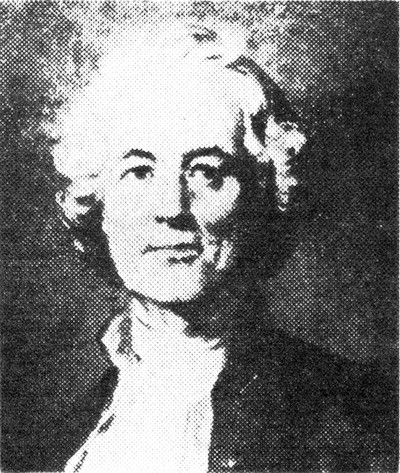
GLUCK
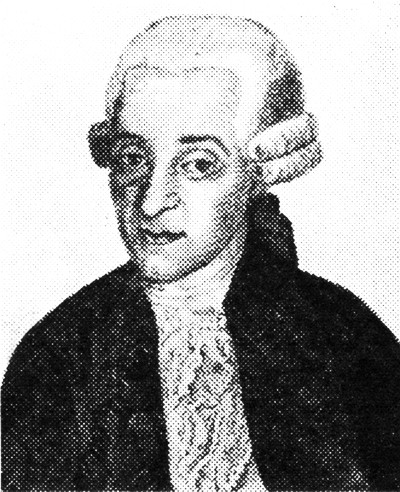
L. MOZART
Part 2 tomorrow.
Then soon afterward Haydn met Gluck, the opera composer; and another time Wolfgang Mozart and his father, Leopold Mozart. So you see he was getting on famously.

GLUCK

L. MOZART
Part 2 tomorrow.
One day he was invited to become Music Director (or Vice-Capellmeister, as it was called) in the family of a great man who was known as Prince Paul Anton Esterhazy.
Haydn's position in the Esterhazy home gave him just the opportunity he wanted. There was an orchestra, and for it he composed all sorts of music.
When the band was to play for the Prince's family and its guests, Haydn and the players were required to wear white stockings and white collars, and a pigtail or tie-wig.
If you could have watched him conduct the players, you would have seen a very short man with short legs; his face pitted with the marks of small-pox. His nose was large, his eyes gray, but of the kindest expression.
And here is a picture which shows exactly how the "good-natured sort of fellow" looked.
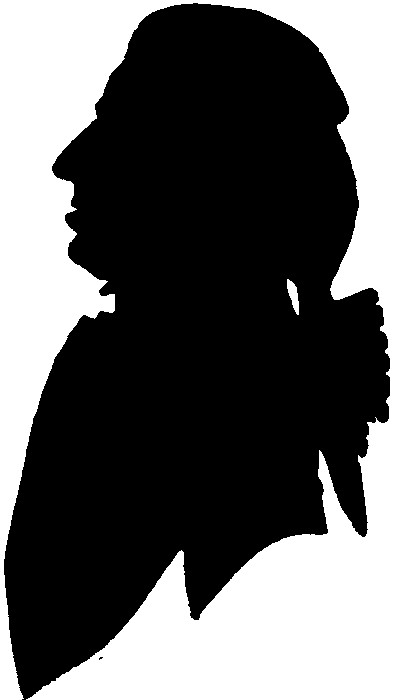
SILHOUETTE OF HAYDN
A butcher in the town where Joseph was living wanted to celebrate his daughter's marriage with fitting music, and was bold enough to ask Joseph to compose a Minuet for the occasion. Joseph good-naturedly consented, and wrote the Oxen Minuet, and made the butcher and his daughter very happy. People say that soon after the wedding the butcher appeared at Joseph's door leading an ox all decorated with ribbons and with gilded horns.
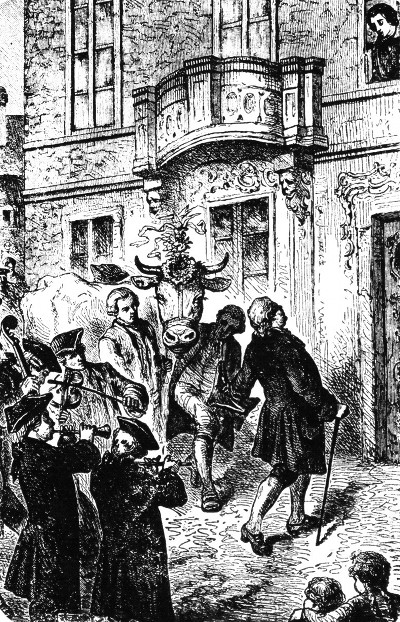
OXEN MINUET
For many years Haydn remained in the peace and quiet of the Esterhazy family life. But, nevertheless his good work was heard of in distant places. He received many invitations to travel to foreign countries. One of these he accepted. He went to England; twice in fact. The night before he left Vienna he and Mozart dined together.
"Do not go on such a long journey," Mozart begged of him. "You are too old and you do not know languages enough to travel through so many countries."
"But," said Haydn, "I know one language that is understood everywhere—the language of music."
Mozart said farewell to his old friend. They never met again.
On the way north, along the Rhine, Haydn met Beethoven at Bonn; and it was arranged that Beethoven should study with Haydn on his return to Vienna.
When the traveler reached Calais he took the boat to Dover in England. He was so enchanted by the sight of the sea that he sat on deck all the way, to watch it. Never before had he seen such a sight, for, we must remember, he was born far inland.
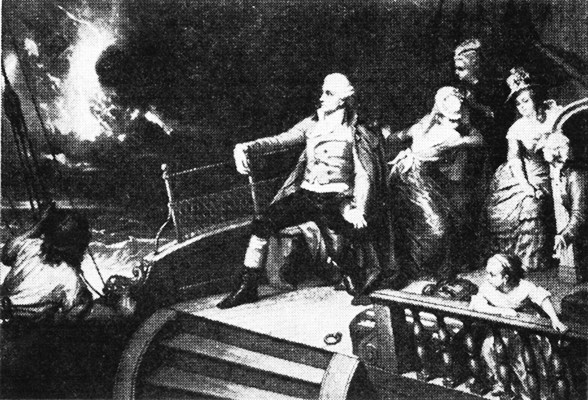
HAYDN ON CALAIS BOAT
Most men do their best work in their younger years, but in Haydn's later years he wrote two of his greatest works: The Creation and The Seasons. The Creation is loved by all people. It is one of a group of favorite oratorios which have found a warm place in the hearts of the people. With it stand The Messiah, Judas Maccabaeus, St. Paul and Elijah. Do you know who composed each of these?
After the English journeys, Haydn lived quietly in Vienna in what is now known as the Haydn house. Should you ever go to Vienna you will be welcomed there by the caretaker, who will show you the rooms in which Haydn lived.
One day toward the end of his life he asked his servant to carry him to the piano. While the members of his household stood near him he played three times, very solemnly, the Emperor's Song.
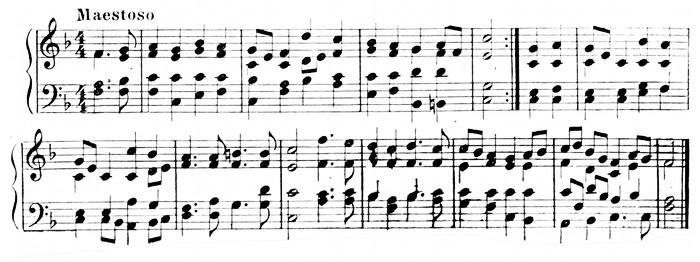
THE EMPEROR'S SONG Listen
This is the way Haydn wrote his name—
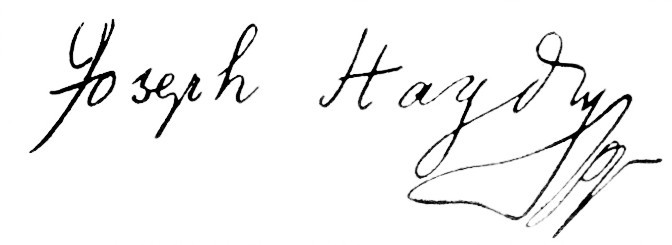
Haydn's position in the Esterhazy home gave him just the opportunity he wanted. There was an orchestra, and for it he composed all sorts of music.
When the band was to play for the Prince's family and its guests, Haydn and the players were required to wear white stockings and white collars, and a pigtail or tie-wig.
If you could have watched him conduct the players, you would have seen a very short man with short legs; his face pitted with the marks of small-pox. His nose was large, his eyes gray, but of the kindest expression.
And here is a picture which shows exactly how the "good-natured sort of fellow" looked.

SILHOUETTE OF HAYDN
A butcher in the town where Joseph was living wanted to celebrate his daughter's marriage with fitting music, and was bold enough to ask Joseph to compose a Minuet for the occasion. Joseph good-naturedly consented, and wrote the Oxen Minuet, and made the butcher and his daughter very happy. People say that soon after the wedding the butcher appeared at Joseph's door leading an ox all decorated with ribbons and with gilded horns.

OXEN MINUET
For many years Haydn remained in the peace and quiet of the Esterhazy family life. But, nevertheless his good work was heard of in distant places. He received many invitations to travel to foreign countries. One of these he accepted. He went to England; twice in fact. The night before he left Vienna he and Mozart dined together.
"Do not go on such a long journey," Mozart begged of him. "You are too old and you do not know languages enough to travel through so many countries."
"But," said Haydn, "I know one language that is understood everywhere—the language of music."
Mozart said farewell to his old friend. They never met again.
On the way north, along the Rhine, Haydn met Beethoven at Bonn; and it was arranged that Beethoven should study with Haydn on his return to Vienna.
When the traveler reached Calais he took the boat to Dover in England. He was so enchanted by the sight of the sea that he sat on deck all the way, to watch it. Never before had he seen such a sight, for, we must remember, he was born far inland.

HAYDN ON CALAIS BOAT
Most men do their best work in their younger years, but in Haydn's later years he wrote two of his greatest works: The Creation and The Seasons. The Creation is loved by all people. It is one of a group of favorite oratorios which have found a warm place in the hearts of the people. With it stand The Messiah, Judas Maccabaeus, St. Paul and Elijah. Do you know who composed each of these?
After the English journeys, Haydn lived quietly in Vienna in what is now known as the Haydn house. Should you ever go to Vienna you will be welcomed there by the caretaker, who will show you the rooms in which Haydn lived.
One day toward the end of his life he asked his servant to carry him to the piano. While the members of his household stood near him he played three times, very solemnly, the Emperor's Song.

THE EMPEROR'S SONG Listen
This is the way Haydn wrote his name—

No comments:
Post a Comment